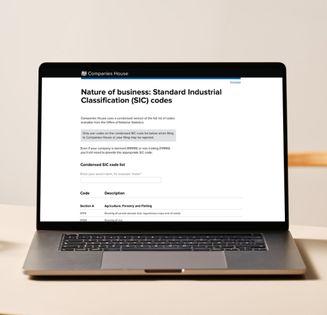- Osome UK
- Company Registration
Register a Limited Company in the UK
Company registration in the UK doesn't have to be a hassle. Let us handle the formation process for you online so you can focus on your business. Let's start by checking if your Ltd company name is available.

Online company formation with Osome
Access to experts
Register your limited company with us and a dedicated business expert will always be at hand, via live chat or over the phone.
Effortless online process
Simply send us your documents via live chat. We'll fill out your Companies House application and send it to you for your digital signature.
Help opening a bank account
Get guidance from our experts on the best business bank account for you and referrals to our industry-leading partners.
All documents stored in one, convenient place
A complete set of company incorporation documents for limited companies, ready to go from day one.
Simple and fast company formation
The cost to register a company with Osome depends on what you need. We can simply handle the registration for you. Or we can handle your compliance and accounting needs too. Take a look at your options below:
Basic for residents
Set up as a limited company and receive all legal paperwork
VAT included
Setting up
Documents
Optional add-ons
All-in-one for residents
Register a limited company and get all needed compliance
£299
+ VAT
Setting up
Documents
Beyond incorporation
Optional add-ons
Setting up
Documents
Beyond incorporation
Optional add-ons
The company registration process in the United Kingdom

Choose a new company name
Your name must be unique and meet government standards. To prevent your name from being rejected by Companies House, here are a few general rules to follow.

Choose the SIC code
Your Standard Industrial Classification (SIC) Code defines your industry and the rules and regulations applied to your business. Make sure you pick the right code when registering your company.

Prepare your documents
All you need to do before you get started is:
- Prepare passport copies and proof of address for yourself and any other directors or shareholders
- Choose your company address. Use your home address if you're comfortable with this info being public, or register an address through us

Open a business bank account
You'll need a business bank account to open your company, receive money and pay invoices. We partner with local banks that can set up your account online in just a few days.


Submit everything to Companies House
From there, we'll register your company for you by preparing the following information:
- Memorandum of Association
- Articles of Association
You can leave it all to us. We'll share your documents with Companies House.
You're ready
Register your company in three easy steps
Choose your package
Start with what you need right now and add specialist services later as you grow.
Submit your details
We'll tell you what information and documents you need to provide for registration, and offer our advice.
Get confirmation and paperwork
Receive your certificate of incorporation and key company documents. It’s that simple!
What our clients think about Osome services
“Osome just made everything easier.”

91 %of customers recommend Osome services
“Osome was a great way to help me start my company in the UK. Really grateful to Sabah Adnan for guiding me throughout the process.”
Sankar Banerjee
What you get when you register a company
Digital Certificate of Incorporation
This document outlines your limited company information and confirms your business can legally trade in the UK. It includes:
- Company’s registered name
- Company registration number
- Company registration location (England and Wales, Scotland or Northern Ireland)
- Incorporation date
Digital Statutory forms
These forms contain information about the limited company's directors, secretaries and members.
Any form completed and sent to Companies House will be on the public record. This means the information, including any personal data, will be public unless the information is sensitive or restricted.
It’s important to keep these statutory forms up to date.
Articles of Association
These are written rules about running your company. Articles of Association are agreed by the shareholders or guarantors, directors, and the company secretary.
All limited companies must have Articles of Association after registering. You can write your own Articles of Association for your company, or use model ones provided by the UK government (these are default Articles of Association your company can use).
Bank account
Opening a business bank account allows your to handle financial transactions in your company's name, with features tailored to business needs.
It is a legal requirement for limited companies and offers the advantage of keeping personal and company finances separate for tax purposes.
A business account is solely dedicated to business-related activities and operates independently from your personal finances.
FAQ
What are the benefits of registering a limited liability company?
Forming a limited liability company (LLC) creates a private business entity that's separate from its founders, directors and shareholders.
The business is given a unique company registration number by Companies House that differentiates it from the people running the company, giving it legal independence.
All the debts, risks, and responsibilities are made in the company’s name, and not in yours.
Can I register a UK Ltd company myself without the help of a solicitor or an accountant?
Yes, you can. But it can take longer since the documents, requirements, and admin can be confusing. If you are willing to put in the hours, you can set up your company yourself. This is perfectly legal.
How long does it take to form a company?
It depends on you. If you take the DIY approach to opening a company it might take longer. But if you use an incorporation service, it can take as little as 3 to 6 working hours.
Once your business is active (i.e. trading), you then have 3 months to register with HMRC (the UK's tax authority).
If you choose to start trading straight away, your company is 'active' and you must register with HMRC for corporation tax within 3 months.
Please note Companies House’s opening hours when processing your applications — they operate between 9am-5pm, Monday-Friday.
How much does it cost to register a company?
It's surprisingly fast and easy to establish a private limited company compared with actually starting the business. The process of setting up a limited company can be completed within 24 hours, depending on which route you choose.
There are three ways to form a limited company. You can either do it through Companies House yourself, or you can hire a third-party agent or accountant.
There is a fee of £50 with Companies House to register your company, and it can be paid with debit, credit, or PayPal accounts. Your company is usually registered within 24 hours.
How do I incorporate a company online?
You can usually set up a limited company within 24 hours by registering online with the Companies House here. You will be registered for Corporation Tax when you do form your Ltd company. Payment for registration costs £50. You can also use company formation agents like us for a fuss-free way to register your company while you settle other important parts of your business.
How do I register a new company name?
When you incorporate your company on Companies House, you register your company name as well. Before you register your company, you will have to prepare a company name. Private limited company names have to be unique. Do this by checking if the company name you want is available by using the name availability tool on Companies House. Also, check with the UK Intellectual Property Office that your chosen company name does not clash with an existing trademarked name. No matter how unique your company name is, it will usually end with either ‘Limited’ or ‘Ltd’. If your company was registered in Wales, you can include the Welsh equivalents ‘Cyfyngedig’ and ‘Cyf’ instead.
How do I register a Ltd company?
To register, you need to have chosen a name for your limited company. First, check that the name is available. This will speed up the process.
You will then need to provide some details to Companies House and HMRC. First, a registered address. The authorities will send official mail for your Ltd company here. The company address needs to be in the UK. The authorities need to be able to reach the company directors at this address. Secondly, you will need to provide the details of your company directors, including their full name, date of birth, and residential address. Thirdly, each company must have one shareholder. Companies House and HMRC will want their details too.
Next, you'll have to allocate shares to your shareholder(s). A simple approach would be to assign one share to each shareholder and make each share worth £1.
After that, the next step is to prepare your company's Memorandum and Articles of Association.
You can register your limited company online, where you will be registered for Corporation Tax simultaneously, or you can register by post, through an agent like us, or a third-party software. When you register your company, you'll need to create a Government Gateway user ID and password. A personal Government Gateway ID is not valid.
Your company can usually be registered within 24 hours.
What are the company registration documents?
Company registration documents are the key pieces of documentation issued by Companies House once you have incorporated. These documents are:
- Your certificate of incorporation
- Your articles of association
- Your memorandum of association.
You must retain these documents at your registered office address. You will need them at various points in your company's lifetime.
What is a company registration number?
A company registration number (CRN) is a unique eight-digit code assigned to all incorporated businesses.
The main function of a CRN is to confirm that a business has been incorporated. You also need your CRN number when you:
- Contact Companies House
- Register for Corporation Tax
- File your annual accounts and submit yearly tax returns
- Make changes to your company details.
What is a company registration certificate?
Your company registration certificate is a document issued by Companies House once you incorporate. It contains your company's vital information, including:
- Your company's full name
- Your company's unique registration number
- Your company's date of incorporation.
Does Osome register my business directly with Companies House?
Yes. If you use our incorporation service, we handle all correspondence with Companies House on your behalf. We handle your documents online via chat, prepare the application and file it with the authorities.
How much tax will I save if I form a limited company vs being a sole trader?
A limited company is substantially more tax-efficient than a sole trader.
Limited companies pay corporation tax on their profits at a flat rate of 19%. And as a director, you can minimise your personal tax and National Insurance Contributions (NIC) by paying yourself a mixture of a salary and dividends.
Sole traders pay 20-45% Income Tax on all taxable earnings. They also pay Class 2 and Class 4 National Insurance.
I don’t live in the UK, can I still open a UK company and bank account?
Yes. You are not required to be a UK resident or citizen to set up a limited company in the UK.
The same is true for business bank accounts. Unlike in other countries, opening a bank account for non-residents in the UK is legal. Of course, you must meet the criteria of the bank you're applying to.
What's the best way to do bookkeeping for my UK-registered company?
Whether you're in the UK or not, the best and most effortless way to do your bookkeeping is to outsource an accounting service like Osome's. That way, all your financial admin will be handled so that you can focus on doing business.
Fresh insights from our business blog
Setting Up An Offshore Company in the UK
Want to set up an offshore company? It’s important to consider all aspects of the process, from your company structure and the jurisdiction to understanding tax liabilities. This article unpacks all you need to know about incorporating a business in an offshore jurisdiction. Shall we get started?

Clash Of The (property) Titans: Serviced Accommodation Vs. Buy-to-let
Starting your property investment journey can be overwhelming. This is especially true when you consider there are as many strategies to investing as there are properties on the market. With insights and advice from experts, you can navigate the confusion, and jumpstart your success.

Good News for Small Businesses in 2024 as the VAT Registration Threshold Increases
UK Chancellor delivered some good news for small businesses in the 2024 Spring Budget Speech. A lower VAT registration threshold will allow hundreds of businesses room to breathe. Read the Osome article for more.

Get expert tips and business insights
By clicking, you agree to our Terms & Conditions, Privacy and Data Protection PolicyWe’re using cookies! What does it mean?


